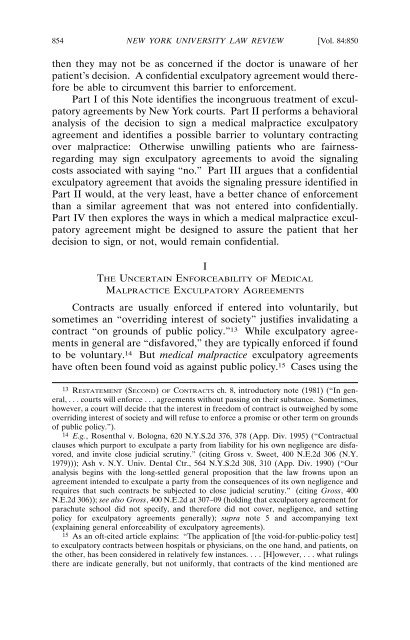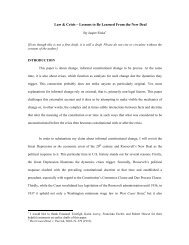In Search of an Enforceable Medical Malpractice Exculpatory
In Search of an Enforceable Medical Malpractice Exculpatory
In Search of an Enforceable Medical Malpractice Exculpatory
You also want an ePaper? Increase the reach of your titles
YUMPU automatically turns print PDFs into web optimized ePapers that Google loves.
854 NEW YORK UNIVERSITY LAW REVIEW [Vol. 84:850<br />
then they may not be as concerned if the doctor is unaware <strong>of</strong> her<br />
patient’s decision. A confidential exculpatory agreement would therefore<br />
be able to circumvent this barrier to enforcement.<br />
Part I <strong>of</strong> this Note identifies the incongruous treatment <strong>of</strong> exculpatory<br />
agreements by New York courts. Part II performs a behavioral<br />
<strong>an</strong>alysis <strong>of</strong> the decision to sign a medical malpractice exculpatory<br />
agreement <strong>an</strong>d identifies a possible barrier to voluntary contracting<br />
over malpractice: Otherwise unwilling patients who are fairnessregarding<br />
may sign exculpatory agreements to avoid the signaling<br />
costs associated with saying “no.” Part III argues that a confidential<br />
exculpatory agreement that avoids the signaling pressure identified in<br />
Part II would, at the very least, have a better ch<strong>an</strong>ce <strong>of</strong> enforcement<br />
th<strong>an</strong> a similar agreement that was not entered into confidentially.<br />
Part IV then explores the ways in which a medical malpractice exculpatory<br />
agreement might be designed to assure the patient that her<br />
decision to sign, or not, would remain confidential.<br />
I<br />
THE UNCERTAIN ENFORCEABILITY OF MEDICAL<br />
MALPRACTICE EXCULPATORY AGREEMENTS<br />
Contracts are usually enforced if entered into voluntarily, but<br />
sometimes <strong>an</strong> “overriding interest <strong>of</strong> society” justifies invalidating a<br />
contract “on grounds <strong>of</strong> public policy.” 13 While exculpatory agreements<br />
in general are “disfavored,” they are typically enforced if found<br />
to be voluntary. 14 But medical malpractice exculpatory agreements<br />
have <strong>of</strong>ten been found void as against public policy. 15 Cases using the<br />
13 RESTATEMENT (SECOND) OF CONTRACTS ch. 8, introductory note (1981) (“<strong>In</strong> general,<br />
. . . courts will enforce . . . agreements without passing on their subst<strong>an</strong>ce. Sometimes,<br />
however, a court will decide that the interest in freedom <strong>of</strong> contract is outweighed by some<br />
overriding interest <strong>of</strong> society <strong>an</strong>d will refuse to enforce a promise or other term on grounds<br />
<strong>of</strong> public policy.”).<br />
14 E.g., Rosenthal v. Bologna, 620 N.Y.S.2d 376, 378 (App. Div. 1995) (“Contractual<br />
clauses which purport to exculpate a party from liability for his own negligence are disfavored,<br />
<strong>an</strong>d invite close judicial scrutiny.” (citing Gross v. Sweet, 400 N.E.2d 306 (N.Y.<br />
1979))); Ash v. N.Y. Univ. Dental Ctr., 564 N.Y.S.2d 308, 310 (App. Div. 1990) (“Our<br />
<strong>an</strong>alysis begins with the long-settled general proposition that the law frowns upon <strong>an</strong><br />
agreement intended to exculpate a party from the consequences <strong>of</strong> its own negligence <strong>an</strong>d<br />
requires that such contracts be subjected to close judicial scrutiny.” (citing Gross, 400<br />
N.E.2d 306)); see also Gross, 400 N.E.2d at 307–09 (holding that exculpatory agreement for<br />
parachute school did not specify, <strong>an</strong>d therefore did not cover, negligence, <strong>an</strong>d setting<br />
policy for exculpatory agreements generally); supra note 5 <strong>an</strong>d accomp<strong>an</strong>ying text<br />
(explaining general enforceability <strong>of</strong> exculpatory agreements).<br />
15 As <strong>an</strong> <strong>of</strong>t-cited article explains: “The application <strong>of</strong> [the void-for-public-policy test]<br />
to exculpatory contracts between hospitals or physici<strong>an</strong>s, on the one h<strong>an</strong>d, <strong>an</strong>d patients, on<br />
the other, has been considered in relatively few inst<strong>an</strong>ces. . . . [H]owever, . . . what rulings<br />
there are indicate generally, but not uniformly, that contracts <strong>of</strong> the kind mentioned are
















